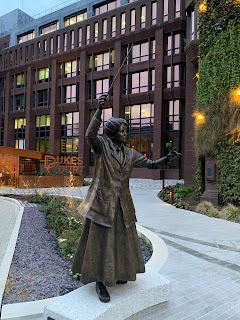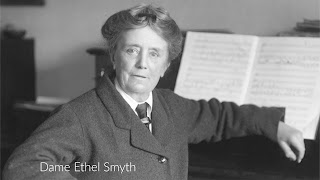In late March I received an e-mail asking me to review
pianist Jennifer King’s recording, Souvenance. I highly recommend listening to this recording,
not just once, but many, many times.
Congratulations to Jennifer on a beautiful presentation of Romances,
Nocturnes and a Meditation composed by eight women composers.
https://www.jenniferkingpiano.com/
You can buy or stream the recording on almost any platform. Enjoy!
Here’s my review:
Nineteenth century French Impressionist painters created works of art depicting night. Their use of darkly hued colors affects our senses. Not to be outdone, French Impressionist composers took up the word “Nocturne” and began creating short works, that similar to the paintings, created the sense of night employing the colors a pianist infuses in their playing.
Jennifer King’s newly released CD; Souvenance is a
delectable presentation of Nocturnes, Romances and a Meditation composed by eight
women. Much like the Impressionist
painters, King paints each composer’s interpretation of night with sensitive
colors and attention to details of phrasing and dynamics.
Clara Schumann’s “Notturno” and Fanny Mendelssohn’s “Nocturne”
explore the darker side of night which reflects their personal life. Clara’s, without doubt, expresses the
composer’s life as the stable caretaker of seven children
and the primary wage earner in her marriage to Robert Schumann. Night may have been
her time to process her worries, fears and compose new works. Clara’s nocturnal troubles are portrayed with
a haunting opening melody played by King with tender attention to the melody
and eighth note bass line rocking that gives rise to a desire for
hopefulness. Mendelssohn’s struggle with
the inequality brought upon women composers of her day is presented with a
melancholy melody supported by minor chords and a rustling sixteenth note
pattern that moves between the dreamy bass lines and into the upper reaches of
the keyboard that sparkle with the excitement of the night and perhaps her joy
of expression through composing.
French composers Mel Bonis and Cecile
Chaminade ‘s Nocturnes, Romances and Meditation are a bounty of memorable,
lilting melodies and even some humor.
Ms. King‘s lyrical playing gives calming, unrushed voicing to the
rustling bass lines while the melody floats above. Her sensitivity to balanced dynamics from
pianissimo to forte is subtle never over emphasizing changes yet they gently
flow.
Not only did British born composer
Ethel Smyth push for a woman’s right to vote in England, she also pushed the
boundaries of form in her Nocturne. Moscow born Sophie Eckhardt-Gramatté’s
“Caprice II Nocturne – Gut Ruhe” stretches the feeling of nocturne beyond the
romantic form.
King captures Smyth’s wonderment of
night. Dark moments lead into a
sparkling atmosphere with delicate phrasing and voicing for the canon to be
identified and heard. With Echardt-Gramatté,
Jennifer King performs the unrest with authority and understanding of
how the composer expressed her experiences of night. Both Nocturnes are wishes for a good rest.
Delightfully, a jazz nocturne is included on this recording. Dana Suesse’s “Jazz Nocturne” begins with a melody
played by the right hand then opens into lush chords that support the
melody. Tuneful and jazzy, King’s
playing is fun, energetic rhythmically and creates the sensation of sitting in
a jazz night club of years gone by.
A Joni Mitchell inspired tribute, taking her as a mentor to
keep fighting through life’s trials and tribulations. Holding Joni Mitchell in esteem, this “Blue”
and the other seven composers, whose
lives were described in their music, have been brought to life in this
heartfelt tribute Souvenance.
Co-Founder & Chair
The Gena Branscombe Project
#BringingBackBranscombe




























